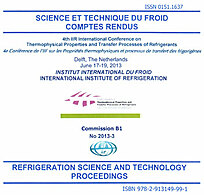
Document IIF
Condensation du HFO1234ze(E) à l'intérieur d'un échangeur de chaleur à plaques brasées.
HFO1234ze(E) condensation inside a brazed plate heat exchanger.
Numéro : pap. n. TP-015
Auteurs : LONGO G. A., ZILIO C., RIGHETTI G., et al.
Résumé
This paper presents heat transfer coefficients and pressure drops measured during condensation ofHFO1234ze(E), a low Global Warming Potential (GWP) refrigerant, inside a brazed plate heat exchanger for various values of saturation temperature, refrigerant mass flux and vapour super-heating. The heat transfer coefficients show weak sensitivity to saturation temperature and great sensitivity to refrigerant mass flux and vapour super-heating. At low refrigerant mass fluxes (< 20 kg m-2s-1) the heat transfer coefficients are independent of mass flux and condensation is gravity-dominated. For higher refrigerant mass fluxes (>20kg m-2s-1) the heat transfer coefficients depend on mass flux and forced convection condensation occurs. In the forced convection condensation region the heat transfer coefficients show a 32% to 35% enhancement for a doubling of the refrigerant mass flux. The condensation heat transfer coefficients of super-heated vapour are from 8% to 11% higher than those of saturated vapour. HFO1234ze(E) exhibits lower (4% to6%) heat transfer coefficients and higher (10% to 20%) frictional pressure drops than those of HFC134aunder the same operating conditions.
Documents disponibles
Format PDF
Pages : 8 p.
Disponible
Prix public
20 €
Prix membre*
Gratuit
* meilleur tarif applicable selon le type d'adhésion (voir le détail des avantages des adhésions individuelles et collectives)
Détails
- Titre original : HFO1234ze(E) condensation inside a brazed plate heat exchanger.
- Identifiant de la fiche : 30008094
- Langues : Anglais
- Source : 4th IIR Conference on Thermophysical Properties and Transfer Processes of Refrigerants
- Date d'édition : 17/06/2013
Liens
Voir d'autres communications du même compte rendu (69)
Voir le compte rendu de la conférence
-
HFO1234ze(Z) saturated vapour condensation insi...
- Auteurs : LONGO G. A., ZILIO C., RIGHETTI G., et al.
- Date : 14/07/2014
- Langues : Anglais
- Source : 2014 Purdue Conferences. 15th International Refrigeration and Air-Conditioning Conference at Purdue.
- Formats : PDF
Voir la fiche
-
R32 partial condensation inside a brazed plate ...
- Auteurs : MANCIN S., DEL COL D., ROSSETTO L.
- Date : 16/07/2012
- Langues : Anglais
- Source : 2012 Purdue Conferences. 14th International Refrigeration and Air-Conditioning Conference at Purdue.
- Formats : PDF
Voir la fiche
-
Condensation heat transfer of R407C in a plate ...
- Auteurs : MANCIN S., DEL COL D., ROSSETTO L.
- Date : 13/06/2010
- Langues : Anglais
- Source : IIR/Eurotherm sustainable refrigeration and heat pump technology conference. Proceedings of the Eurotherm Seminar No. 88, Stockholm, Sweden, June 13-16, 2010.
- Formats : PDF
Voir la fiche
-
Experimental investigation during R410A condens...
- Auteurs : MANCIN S., DEL COL D., ROSSETTO L.
- Date : 21/08/2011
- Langues : Anglais
- Source : Proceedings of the 23rd IIR International Congress of Refrigeration: Prague, Czech Republic, August 21-26, 2011. Overarching theme: Refrigeration for Sustainable Development.
- Formats : PDF
Voir la fiche
-
HFO-1234yf condensation inside a brazed plate h...
- Auteurs : LONGO G. A., ZILIO C.
- Date : 16/07/2012
- Langues : Anglais
- Source : 2012 Purdue Conferences. 14th International Refrigeration and Air-Conditioning Conference at Purdue.
- Formats : PDF
Voir la fiche
